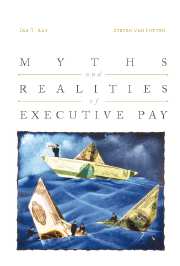Book contents
- Frontmatter
- Contents
- Acknowledgments
- Prologue: The Compensation Committee Meets
- Introduction: The Battle over Executive Compensation
- 1 The Myths and Realities of Pay-for-Performance
- 2 Managerial Power
- 3 External Pressures: The New Context for Executive Compensation
- 4 End of an Era: The Decline of the Stock Option
- 5 The Future of Long-Term Incentives
- 6 Executive Stock Ownership: The Solution to the Executive Compensation Crisis
- 7 Director Compensation in the New Environment
- 8 The Compensation Committee: Creating a Balance between Shareholders and Executives
- 9 Aligning All Employee Pay to Improve Corporate Performance
- 10 International Executive Pay Comparisons
- Conclusion: The Future of Executive Compensation
- Epilogue: Back in the Boardroom
- Appendix A Legal and Regulatory Requirements for Executive Compensation Plans
- Appendix B Summary of the Regulatory and Institutional Mandates and Recommendations
- Appendix C Academic Articles on Pay-for-Performance and the Effectiveness of the Executive Labor Market
- Notes
- Index
3 - External Pressures: The New Context for Executive Compensation
Published online by Cambridge University Press: 31 July 2009
- Frontmatter
- Contents
- Acknowledgments
- Prologue: The Compensation Committee Meets
- Introduction: The Battle over Executive Compensation
- 1 The Myths and Realities of Pay-for-Performance
- 2 Managerial Power
- 3 External Pressures: The New Context for Executive Compensation
- 4 End of an Era: The Decline of the Stock Option
- 5 The Future of Long-Term Incentives
- 6 Executive Stock Ownership: The Solution to the Executive Compensation Crisis
- 7 Director Compensation in the New Environment
- 8 The Compensation Committee: Creating a Balance between Shareholders and Executives
- 9 Aligning All Employee Pay to Improve Corporate Performance
- 10 International Executive Pay Comparisons
- Conclusion: The Future of Executive Compensation
- Epilogue: Back in the Boardroom
- Appendix A Legal and Regulatory Requirements for Executive Compensation Plans
- Appendix B Summary of the Regulatory and Institutional Mandates and Recommendations
- Appendix C Academic Articles on Pay-for-Performance and the Effectiveness of the Executive Labor Market
- Notes
- Index
Summary
Everybody should have an interest in controlling this explosion in executive pay. The wealth of America has been built through the returns of our public corporations, and if those returns are being redirected to company managements, then the people who get the short end of the stick are the people who hope to retire someday.
Frederick E. Rowe, Jr., chairman, Texas Pension Review BoardI feel nothing but contempt. They pay themselves like rock stars.
Don Hodges, president, Hodges FundSince the advent of the modern corporation, executive pay has been vilified by the media, targeted for reform by activists, and regulated by the government. For the most part, the free market forces that gave rise to and underpin the successful pay-for-performance model have enabled executive pay to withstand the onslaught. However, never before have companies witnessed such an intense confluence of events and a convergence of external forces seeking to reshape the design, delivery, and disclosure of executive compensation.
In a world in which executive pay will be scrutinized, regulated, and revealed in an unprecedented fashion, understanding the external pressures that are creating this new context is a precursor to effectively designing executive pay programs.
Characteristics of external forces
Two characteristics mark these external pressures. First, their intensity rises and falls in a pattern that follows the broad outlines of the business cycle and cyclical movements in the stock market. Historically, during times of relative economic prosperity and rising stock prices, high levels of executive compensation received little attention.
- Type
- Chapter
- Information
- Myths and Realities of Executive Pay , pp. 47 - 70Publisher: Cambridge University PressPrint publication year: 2007



